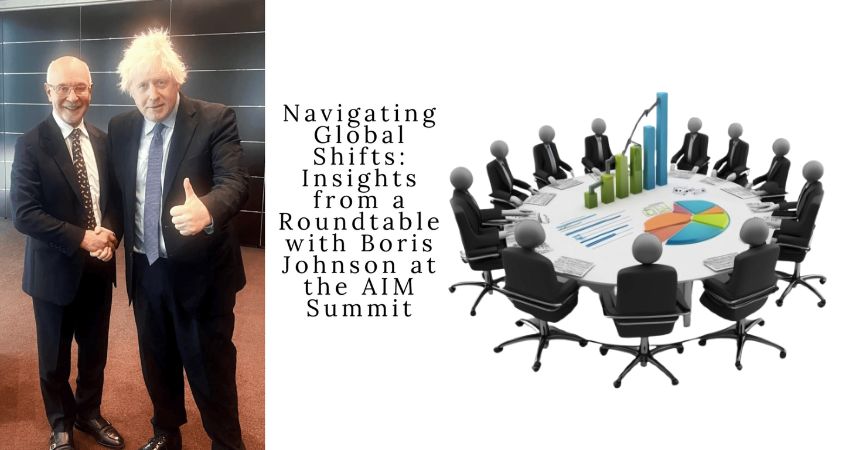The global geopolitical landscape is evolving rapidly, influencing economic policies, security strategies, and international trade. At the AIM Summit in Dubai, Boris Johnson, former Prime Minister of the United Kingdom, shared his insights on the current geopolitical climate and its long-term impact.
The roundtable discussion, chaired by David Gibson-Moore, focused on critical global events, including the Ukraine war, NATO’s role in security, geopolitical challenges in the Middle East, and the UK’s foreign policy post-Brexit. This article explores the major themes of the discussion and their broader implications for global leadership and diplomacy.
Geopolitical Challenges in the Middle East
The Middle East remains a focal point of geopolitical tensions, affecting global energy markets and international relations. David Gibson-Moore’s perspective on global shifts highlighted key factors shaping the region’s stability:
Security Concerns: Conflicts and diplomatic tensions continue to shape the political landscape, impacting international trade and alliances.
Economic Impact: The volatility in the Middle East affects energy security, investment opportunities, and economic growth worldwide.
Diplomatic Solutions: Nations and global organizations are working towards solutions to ensure regional stability and economic progress.
Boris Johnson emphasized the importance of economic diplomacy and strategic partnerships to navigate these ongoing challenges.
Global Security and NATO Post-Ukraine War
The Ukraine war has reshaped global security strategies, especially for NATO and European nations. Key takeaways from the discussion included:
Stronger Military Alliances: NATO members have increased cooperation to enhance defense and deter future threats.
Impact on Energy Policies: The war has forced European nations to rethink their energy dependencies and supply chains.
Evolving Security Priorities: The long-term consequences of the war continue to influence global defense policies and diplomatic relations.
Boris Johnson stressed that collaborative security strategies are essential to safeguard global stability.
The UK’s Foreign Policy and Global Britain Vision
Since Brexit, the UK has focused on redefining its position in global trade and diplomacy. The Global Britain vision post-Brexit prioritizes:
Expanding Trade Agreements: The UK is actively strengthening trade ties with nations such as India, Australia, and Canada.
Participation in Multilateral Organizations: The country remains committed to organizations like the UN, G7, and WTO, ensuring its presence in global policymaking.
Economic and Diplomatic Strategies: The UK’s foreign policy focuses on new economic opportunities, innovation, and international collaboration.
Johnson highlighted the importance of trade agreements like CPTPP and the UK’s growing influence in global markets.
Geopolitical Shifts and Leadership Challenges
As geopolitical shifts redefine global leadership, nations must adapt to emerging challenges. The discussion at AIM Summit highlighted several key insights:
The rise of new economic powers like China and India is reshaping global trade and politics.
Economic strategies must align with geopolitical changes to ensure long-term stability.
International cooperation is crucial for addressing security threats, climate change, and economic recovery.
Boris Johnson pointed out that global leadership requires adaptability, resilience, and strategic decision-making.
Key Takeaways from the Roundtable Discussion
The AIM Summit Dubai roundtable provided valuable insights into the future of global politics, security, and economic diplomacy. Boris Johnson’s insights on global shifts emphasized:
The Middle East remains a key region for global stability and economic security.
NATO and European security policies must evolve to meet new geopolitical challenges.
The UK’s post-Brexit foreign policy prioritizes global trade expansion and diplomatic engagement.
Strategic international cooperation is essential for economic growth and stability.
These discussions highlighted the importance of diplomatic negotiations and economic policies in navigating global uncertainties.
Conclusion
The world is at a crossroads where global leaders must make strategic decisions to ensure security, economic growth, and diplomatic stability. The AIM Summit Dubai served as a platform for discussing critical geopolitical issues and future trends.
As international relations continue to evolve, global cooperation will be vital in shaping a stable and prosperous future. The insights shared by Boris Johnson and David Gibson-Moore offer valuable guidance on navigating these complex global shifts.












